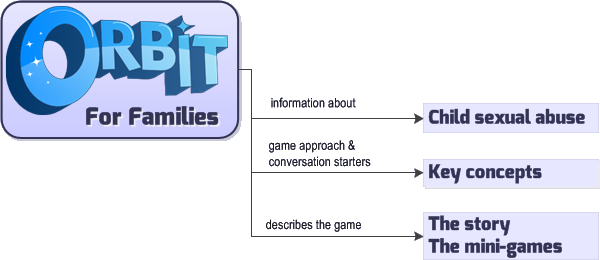For Families
Orbit is a computer game that takes a positive and practical approach to child sexual abuse prevention; an approach that is informed by evidence-based research.
What is Orbit?

Orbit is a sexual abuse prevention program consisting of a computer game, classroom activities, website containing information for parents/caregivers and associated resources. The program is designed for children aged between 8 and 10. It is a free program created by the University of the Sunshine Coast with financial and in-kind support from the Telstra Foundation, Queensland Police Service, Daniel Morcombe Foundation, Sunshine Cooloola Services Against Sexual Violence Inc. and Curious Bear game development company.
Whilst Orbit is designed to be used at school, there are also sections of the Orbit website dedicated to helping parents/caregivers learn more about child sexual abuse prevention. This website also provides ideas on how to talk to your child about the key concepts raised in Orbit.
Your role as parent/caregiver
Research tells us that sexual abuse prevention needs to be addressed by the whole community including parents/caregivers, schools and the general community. You can play your part by exploring this website to find out more about: the Orbit program and how it works, child sexual abuse and its prevention and the key concepts raised in Orbit. We also encourage you to spend some time talking to your child about the key concepts raised in the game. The conversation starters provided in the Key concepts section of this website can help you. You may also like to talk to other parents/caregivers and members of the community about child sexual abuse prevention.
As well as playing Orbit at school, your child can also play the Orbit game on your home computer. Contact your child’s teacher if you would like your child to play the game at home. Your home computer will require a working internet connection in order to play the game. If you wish to play the game yourself, you can either contact your child’s teacher for a username and password or you can sign up for a game account yourself.
Be prepared
Through the course of this program some children may realise that they have been / are being sexually abused. Hence, you should be prepared to receive disclosures of sexual abuse from your child or your child’s friends and classmates. For more information on how to respond to a disclosure, visit the Disclosures section of our website. Here, you can also download a printable wallet card containing sentence prompts that you can keep with you at all times. Although receiving a disclosure can be difficult and emotional for both you and the child, it is important that children have responsible adults they can turn to who can help keep them safe.
How to use this website

Go to the Child sexual abuse section of this website to find out more about child sexual abuse, including how to respond if a child discloses to you that they have been sexually abused. The way adults respond to a disclosure of sexual abuse can affect how well a child recovers so please take some time to familiarise yourself with this section.
Visit the Key Concepts section of the website to find about the key concepts addressed in the game and to find ideas on how you can talk to your child about them. There is no particular order in which to cover these concepts and they will need to be covered over a period of time. It is always a good idea to revisit topics. Here is a suggested order for the key concepts:
- Public and private spaces
- Private body parts and the Body Rules
- Need to Tell situations
- Offender tactics
- Trusted adults and Modes of Communication
- Healthy Self Concept
- Tell & Keep on Telling and Barriers to Telling.
You can go to The Story and The mini-games sections to find out what happens in a particular part of the game.
Can I trust Orbit?
The development of Orbit was informed by evidence-based research and was built in collaboration with counsellors, psychologists, social workers and educators.
